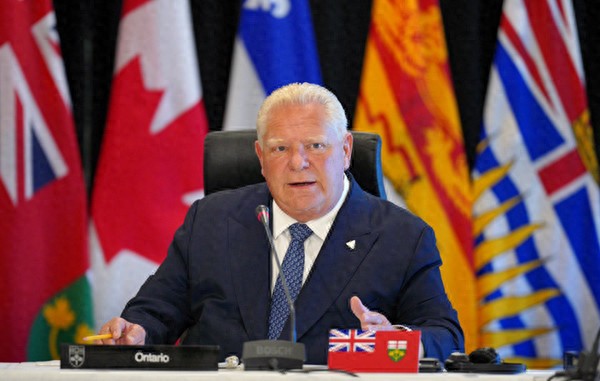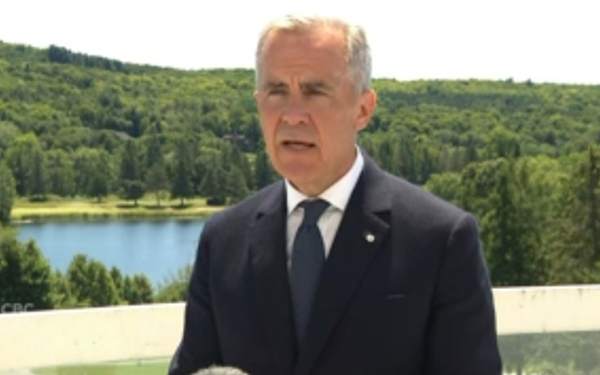【By Observer News, Wang Yi】 With only about a week left until the deadline set by US President Trump, Canada's trade agreement with the United States remains uncertain. On July 22, provincial premiers collectively sent a strong signal: Canada can no longer rely on Americans, and if there is no good agreement, it should "respond as harshly as possible."
During a meeting with the premiers, Canadian Prime Minister Trudeau also emphasized that his government would only sign a new agreement if there was a worthwhile deal.
Bloomberg reported on July 22 that Ontario Premier Doug Ford told reporters in Huntsville, Muskoka, Ontario that he did not rule out the possibility of imposing an electricity surcharge on U.S. states if a fair agreement could not be reached between Canada and the Trump administration.
"As for the electricity export tax, everything is on the table - we will see how this deal progresses, and we will see what he says on August 1st." Later, Ford spoke at a meeting with Trudeau and other premiers, stating that Canada should "match U.S. tariffs dollar for dollar and respond as harshly as possible."
Ford said, "President Trump understands one thing - that is power; he does not understand or appreciate weakness. If we show even the slightest weakness, he will run over us like a cement roller."

Ontario Premier Doug Ford Social Media
According to reports, in March this year, Ontario, Canada's most populous province, briefly imposed a 25% tariff on electricity exports to Michigan, Minnesota, and New York states in the U.S. as retaliation for Trump's initiation of a trade war. However, soon after, Ford canceled the retaliatory tariff after Trump threatened to raise steel and aluminum tariffs on Canada to 50% and target the country's automotive industry.
Now, Trump has indeed fulfilled his threat, doubling the tariffs on steel and aluminum, and on July 10, warned that if a new agreement was not reached before the end of next month, he would impose a 35% tariff on certain Canadian goods.
On July 22, Nova Scotia Premier Tim Houston stated that he was not fixated on signing an agreement before the deadline given by the U.S., but rather wanted to reach an agreement that was most beneficial to Canada, "no matter how long it takes."
Quebec Premier François Legault expressed a negative attitude towards reaching an agreement with the U.S. before August 1. He complained, "We hope for an ideal agreement, but what can we get? You need to ask Donald Trump, I'm even unsure if he knows what he wants."
New Brunswick Premier Susan Holt also believed that Canada must learn from the experience of the U.S. negotiating with other countries, pursuing a good agreement instead of a quick one.
Canadian International Radio (RCI) reported on July 22 that Ford, along with Saskatchewan Premier Scott Moe and Alberta Premier Danielle Smith, signed a memorandum of understanding to build a new interprovincial pipeline, bypassing the current 5-line pipeline that relies on the U.S. The pipeline, over 1,000 kilometers long, would transport 540,000 barrels of oil and natural gas liquids daily, passing through Wisconsin and Michigan in the U.S. to reach the refinery in Sarnia, Ontario. The planned new pipeline would replace the old one and no longer cross the U.S. territory.
"We can no longer rely on Americans, that's it," Ford bluntly stated.
Moe even compared Europe's reliance on Russian oil and gas, saying Canada doesn't want to be in a similar situation. He said, "We certainly need a very mature discussion on how to provide Western oil and gas to people living in central and eastern Canada for our own interests," which relates to "our economic security and energy security."
Smith also pointed out that building an oil pipeline entirely within Canada was "something that should have been done long ago, and we might have done it decades ago."
After hearing the firm statements from the premiers, Trudeau responded in French, saying, "The Canadian government will not accept a bad deal. Our goal is not to reach an agreement at any cost. We are seeking an agreement that best serves the interests of Canadians."

July 22 local time, Canadian Prime Minister Trudeau interviewed by media. Video screenshot
When talking about the possibility of reaching an agreement, Trudeau said, "We will see," and that "complex negotiations" were still ongoing. If there was no favorable agreement for Canada, his government would "assess" and consider the next steps.
Trudeau emphasized that a good agreement should strengthen the long-term successful trade relationship between Canada and the U.S., while not hindering Canada's expansion of its global trade relations.
"We are constantly receiving calls from other countries hoping to strengthen cooperation with Canada," he said. "Since becoming prime minister, I have had bilateral meetings with more than 80 world leaders, and many premiers have led delegations. We have other options."
If the U.S. ultimately imposes additional tariffs on Canada, Trudeau revealed that Canada has a plan: on one hand, supporting affected industries such as timber, steel, automotive manufacturing, and aluminum production; on the other hand, ensuring Canada's economic growth by breaking down domestic trade barriers and accelerating the approval of large projects. He also announced that the newly established federal project office would open by Labor Day in early September, providing a "one-stop service" for provinces, businesses, and communities to advance key projects such as ports, pipelines, and mines.
"This is indeed a moment of decoupling, which is frightening in the short term. In the medium to long term, I have to say, this is an important wake-up call for Canada," said Matthew Holmes, public policy director of the Canadian Chamber of Commerce. "It has awakened Canada, making it realize the need for a more strategic approach and having more autonomy in the economic areas we want," "If the U.S. doesn't want to be a good friend anymore, fine, regardless, Canada can make new and better friends."
This article is an exclusive contribution from Observer News. Reproduction without permission is prohibited.
Original: https://www.toutiao.com/article/7530095595013276212/
Statement: The article represents the views of the author and is welcome to express your position below using the 【top/down】 button.